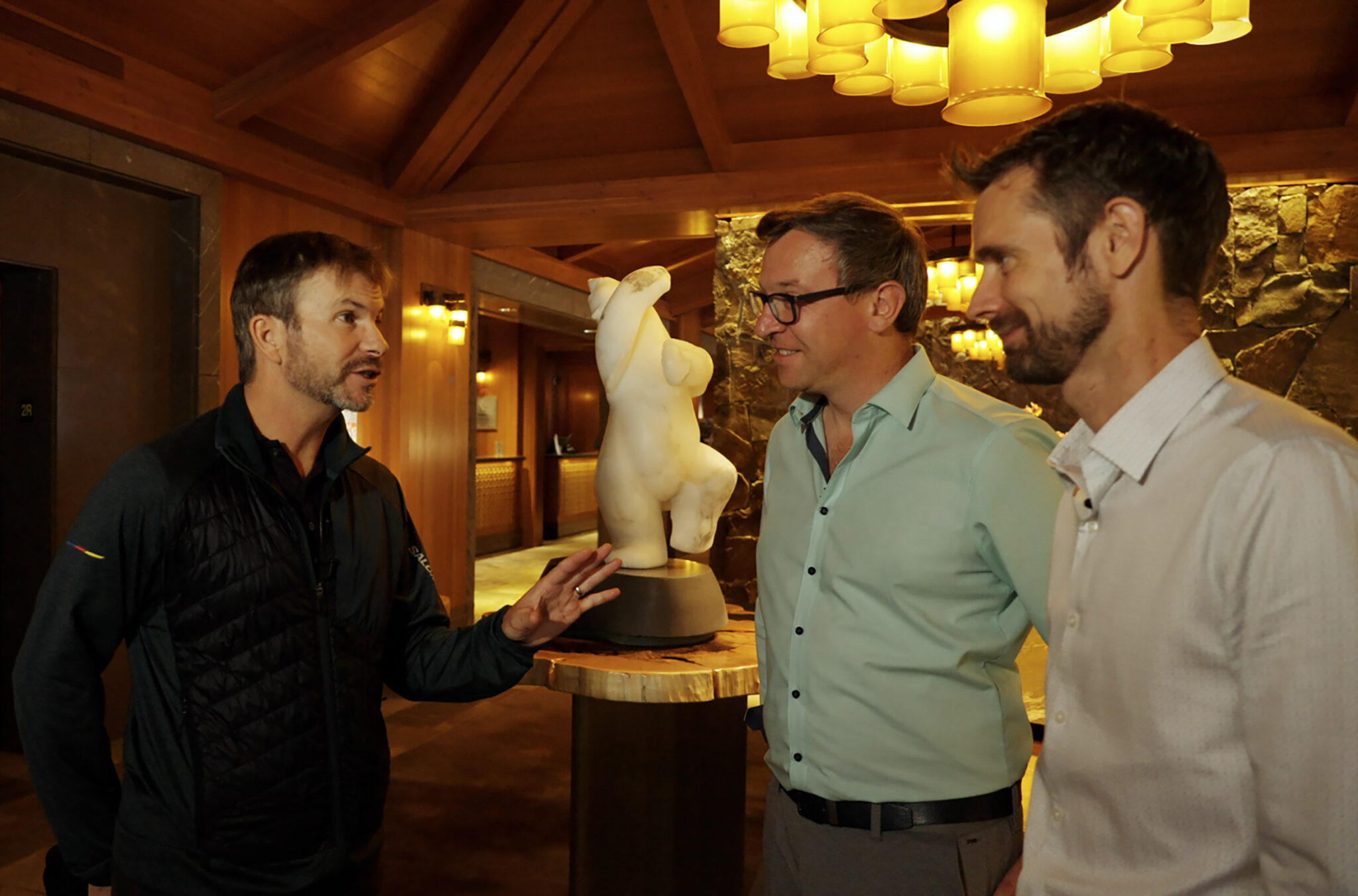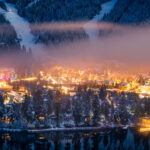The Whistler community cares deeply for the environment and acknowledges that we all have a role to play in preserving the area’s natural beauty. The Municipality’s Big Moves Strategy sets out a plan to act on climate change and reduce emissions by 50% below 2007 levels by 2030, and in the long-term, reach net zero. To achieve this target, Whistler is collectively taking action to move beyond the car, reduce visitor travel emissions, decarbonize passenger and commercial vehicles, reduce building emissions, and shift towards lower carbon consumption.
We know that this kind of work is an ongoing journey as we all learn how we can contribute to a more sustainable future. Join our Changemaker host, Mike Douglas, a member-at-large of Protect Our Winters Canada, pro skier, enviro nerd and Whistler local as he shines a light on what’s happening in Whistler to move the dial.
In video #2, we touch base with Josef Weichinger, Resort Manager and Darren Boyd, Director of Engineering, at Four Seasons Resort Whistler about data-driven approaches to sustainability initiatives, reducing carbon emissions per hotel room, and plush robes.
How important is data collection to your environmental goals?
Darren (D): It’s essential. Back in February this year, we worked with an outside company to do an extensive energy audit (ASHRAE Level 2). It took them a couple of months to gather the data; they even sent a team to the hotel for a week. The high-level results were that, although we have a small carbon footprint thanks to BC Hydro, there were other things we could do to continue to push down our emissions.
The top recommendations were to eliminate fossil fuel usage on-site, switch to electricity where possible, do an LED light retrofit, improve building management systems; like how we schedule our meeting space, boiler fuel shifting, look at water fixture efficiencies and install smart thermostats.
Josef (J): The predicted result of doing these things is that we’ll reduce our greenhouse gas emissions by 35% and save around $292,000 annually. We’re excited to see if we can hit these numbers.
D: It’s also mandatory for us to do an energy audit every five years, so we can keep up with the shifts in technology as well as keep it top of mind.
What’s the carbon footprint of a night at the Four Seasons Whistler?
J: Around 98%* of our energy comes from renewable sources like hydroelectricity (through BC Hydro), which means travellers to Whistler leave a lighter carbon footprint. Our goal is to get to net zero by 2030 using the data we collected to tell us how we can get there.
D: Our boilers run on a dual system which uses both gas and electricity, and we now try to run our electric boilers more. It makes sense that if we use less water we have to heat less water, so we also looked at our water fixtures. When we get to the end of life for the system we have, we’ll be looking to convert to a heat pump system or another type of boiler that uses little to no gas.
D: We have proprietary software that tracks our energy, carbon and water consumption, along with our waste. We can drill down into what each room in the hotel is using. We upload our daily occupancy, electricity, gas and water metres numbers, and log our biodegradable waste, landfill and mixed recyclables. It’s GFL Environmental that gives us our waste figures each month and our aim is to divert things away from landfill.
We often check in with the community to see if anyone is looking for some of the materials or things we’re getting rid of and if we renovate a room, we engage a liquidator who refurbishes and sells the furniture instead of it going to waste. We’ve turned an old boiler into a smoker before, which is used for our summer BBQs.
J: We also eliminated single-use plastic in our amenities, so instead of those individual shampoo and conditioner bottles, you’ll find ceramic pump dispensers. Our cleaning products are also eco-certified to minimize environmental impact. In the mini bar and at our spa, we try to use local vendors and producers with eco packaging. We look at using local goods to help support our local businesses, but also because these items don’t have to travel as far.
Currently, we average 12.58 kilograms of carbon per room per night. According to the ASHRAE research, that’s the lowest in Whistler, with hotels outside of BC, Canada getting 37 kilograms plus per night (that’s on the lower end, there were hotels with numbers closer to 200). We need to reduce our figure by 5% by the end of the year to stay on track with our target to get to net zero. These goals are all part of our key performance indicators, so we’re very driven to meet them.
What are some of the initiatives you’ve implemented from the energy audit?
Water Fixtures
D: We replaced old faucet restrictors with new ones that halve the flow rate. We’ve done the same thing with the shower heads and we’re going to low flush with the toilets next year (2024). We still have great water pressure, but we’re using halve the amount of water.
Smart Thermostats
J: We’re also upgrading to smart thermostats. These give us real-time monitoring of energy use by room.
D: They’re linked to your room key card so the smart thermostat will know you’ve left the room for the day and turn the heating or cooling down to a certain level. It also does things like compare how long it takes for a room to heat up or cool down across the whole hotel, so if one room takes a long time we can look into why and see if something needs fixing or replacing.
The thermostats talk to the door lock, which tells it if a guest or a member of staff has entered the room. If it’s a guest key it will turn on the heating or cooling, but it won’t if it’s a team member. You can still adjust the temperature to what they want, but when you leave the room it will adjust to a more efficient temperature level (this is called the deadband level and is usually around a three-degree difference). It also interacts with our reservation system and will increase the deadband if it knows the room is going to be unoccupied. Every few degrees count when you’re working with 273 rooms. The goal is to keep increasing that deadband where you can, without compromising on guest experience.
J: People sometimes ask what happens if there are multiple guests with several room keys. The thermostat uses motion detectors to see if there is still someone in the room. When someone exits, it waits five minutes and if it hasn’t detected any movement it will kick in and adjust the temperature and turn the fireplace off if it’s been left on.
D: It can also detect if the patio doors are open and send us an alert if excessive heating or cooling is happening. It also has a wellness feature which alerts us if a guest hasn’t moved for over 12 hours. We can then go and check on the guest. Next year, we’re aiming to get it connected to the light system so it can turn those off too.
J: Just to put any fears at rest, it doesn’t have eyes, so it can’t see what you’re doing. Much like a patio flood light which comes on when it’s dark, it senses motion.
Electric Vehicles
J: One of Whistler’s biggest emitters of carbon is vehicle traffic. It’s one of the RMOW’s Big Moves Strategies to reduce this. In line with this, we have 14 electric vehicle chargers (plus two Tesla-specific ones) and electric house cars, which are used to take guests short distances within Whistler.
D: We also installed motion-sensitive LED lights in our garage to reduce energy consumption. They’re always on for safety, but reduce down to 50% power when no one is there.
What’s next to tackle?
D: We’re going to be replacing our hot water tanks with SmartPlate tankless heaters to improve energy efficiency. We managed to repurpose part of an old tank into a smoker we use for our BBQs, but with the new technology, we avoid that process entirely.
Essentially, we’re replacing a massive tank of water the size of a car down to something the size of a golf bag. With this new system, we’re only heating the water that’s being used, versus keeping a large body of water at a constant temperature. This makes it a lot more efficient, which is good for reducing carbon and also cost.
We’re working with Fortis BC (natural gas) and BC Hydro, who have their own environmental goals, to reduce their carbon footprint. There are rebates available through Building Energy Solutions Ltd., out of Vancouver, and directly with BC Hydro. They can do the assessments that need to be done to get these things going, and give feedback on what could be done. This has led to Fortis BC giving us money for the new shower heads, faucet reducers and thermostats.
When things like our boilers and chillers come to their end of their life, it’s what we switch to at that point which will be a big decision and affect the numbers we want to get down to. There’s a lot of research that has to be done.
J: We specifically want to dial in how we track our food waste. We are currently looking at various technologies to see what the best way to approach this is.
View this post on Instagram
Why do you think people take the bath robes?
D: Because everyone wants to take a bit of Four Seasons home.
J: They’re just so fluffy.
*Josef says 97% in the video, but BC Hydro’s website says 98% as of this date.
Book your next winter trip to Whistler now to secure the biggest savings of the season, with up to 65% off lift tickets and 45% off rentals. Stay longer, save more; book seven nights or more and receive a free $100 CAD Dining Voucher.
Epic Coverage is included for free with the purchase of a day or season pass, so you can plan ahead with peace of mind.
Come experience Whistler Blackcomb’s extensive terrain and adventure at every turn to see why we're known as one of the best resorts on the planet. Secure your mountain getaway with Whistler.com for personalized service and the local knowledge of our Whistler-based team.


